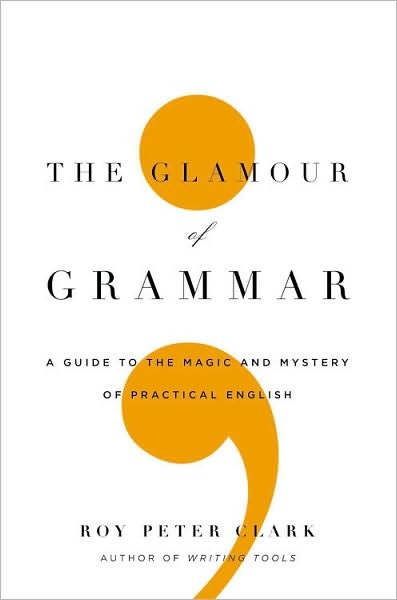 Roy Peter Clark’s The Glamour of Grammar: A Guide to the Magic and Mystery of Practical English makes compulsive reading. Tips to improve your writing leap off every page. Clark has also written another useful manual, Writing Tools which I also recommend. I found both of these books vastly superior to books like Eats Shoots & Leaves by Lynne Truss. GRADE: A
Roy Peter Clark’s The Glamour of Grammar: A Guide to the Magic and Mystery of Practical English makes compulsive reading. Tips to improve your writing leap off every page. Clark has also written another useful manual, Writing Tools which I also recommend. I found both of these books vastly superior to books like Eats Shoots & Leaves by Lynne Truss. GRADE: A


The subject of grammar is a constant topic in my writing group. Some of them would have you use commas at every turn. I hold that two independent clauses of roughly the same length or of a short length separated by the word “and” do not need a comma. Too many commas make the writing jerky to by ear. I will have to see what Mr. Clark says. I am also not a big fan of hyphens. Again, it makes the writing stuttery to me. But I rarely get a story by them without the attempted insertion of both at every turn.
I think you’ll find Clark on your side, Patti. In books like this, the examples make the difference. Clark chooses some excellent writers to illustrate his points.
But EATS SHOOTS AND LEAVES had the catchy title and plenty of publicity that made it a hit. Also, it was fun I must admit.
I sometimes have a problem with using too many commas myself. My problems with reading are usually not with the grammar as much as with just plain bad usage: misusing infer/imply, “hissing” words without an ‘s’ in them, etc.
THE GLAMOUR OF GRAMMAR explores all those issues, Jeff.
I’m afraid I’m a big fan of hyphens – meaning I use them a lot and probably incorrectly – but then that’s just me. That last sentence could have been done with commas but not straight through with no punctuation. I didn’t like Eat Shoots Leaves as well as a lot of people, though I did read it. I’ll try this one too. Jeff – you’re right, he hissed.
The essence of writing is constructing good sentences, Rick. That’s what THE GLAMOUR OF GRAMMAR focuses on.
Rick, I use a lot of hyphens too – so sue me.
Hyphens are more dramatic than commas, Jeff. But they can be over-done, too.
Okay-here’s one. Can the word “disinterest” be used to mean you have no interest in something. Or can it only mean that you are a “disinterested party.” Like a judge, for instance. That’s one we go round and round on.
I looked at the cake with disinterest.
Isn’t that better than I had no interest in the cake. The first implies a certain attitude the second doesn’t.
Roy Peter Clark addresses some of your issues, Patti. The word choice reflects on the type of character expressing the thought or action. If you looked at the cake with disinterest that tells the reader something different than “I had no interest in the cake” because you just ate a pizza.
I like and approve of the “no interest in ___” answer, Patti. It can get a little more complicated when it becomes apart of a double, or triple negative sentence, however. Ex: what, exactly, does “shows little disinterest” mean? Is it really shows little interest, some interest but not complete interest… ugh.
Convoluted prose always causes trouble, Rick. Double negatives, sloppy verbs, 200-word sentences all spell trouble.
Don’t tell that to Bill Crider’s favorite William Faulkner. Or Henry James, for that matter.
Faulkner and Henry James could spin those 200-word sentences, Jeff. But, most writers don’t have Faulkner’s or James’ talent.